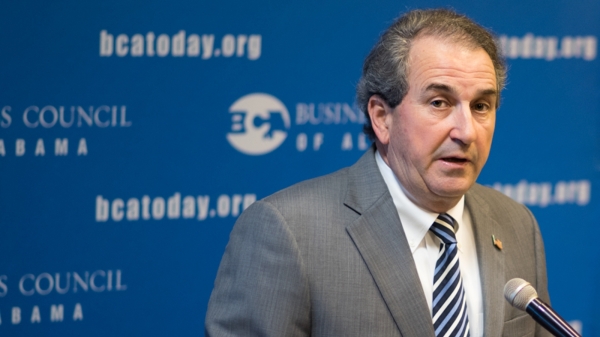Members of Alabama House Ways and Means General Fund Committee on Tuesday gave favorable reports to three bills that would allow the state to move forward with a $1.3 billion prison construction plan, sending the bills to the full House for a possible vote Wednesday.
House Bill 4 calls for the construction of three new prisons and renovations of existing facilities to be paid for through a bond issuance not to exceed $785 million, in addition to other funds to be made available in the other two bills.
House Bill 5 would allocate $400 million in federal COVID aid through the American Rescue Plan to be used towards prison construction.
House Bill 6 calls for as much as $154 million of the state’s general fund money to go toward those prison construction costs, in addition to allocating $19 million from the state’s General Fund to buy the empty Perry County Correctional Facility in Uniontown from the private prison company Geo Group, to be used by the Alabama Bureau of Pardons and Paroles to house parolees and probationers who violate the terms of their release on technical matters but didn’t commit new crimes.
Two new 4,000-bed prisons for men would be located in Escambia and Elmore counties, and a new prison for women would be located in Elmore County and would replace the Julia Tutwiler Prison for Women, but the bills don’t include separate funding for construction of the new women’s prison.
The plan calls for closing Elmore Correctional Facility, Staton Correctional Facility, Hamilton Aged & Infirmed Center and the St. Clair County Correctional Facility.
Troy Stubbs, chairman of the Elmore County Commission, where two existing prisons are to close and one of the new prisons is to be located, spoke in favor of the plan during a public hearing on those bills earlier on Tuesday.
“We recognize that it has a tremendous economic impact on our community,” Stubbs said.
Atmore Mayor Jim Staff said the existing prisons have been great for Elmore County, which supplies the prison with utilities.
Morgan Duckett, an Auburn University student and one of the founders of Alabama Students Against Prisons, spoke out against new prisons and said the U.S Department of Justice is suing the state over its prisons.
“This lawsuit is continually named in arguments supporting the construction of new facilities, but it’s abundantly clear that none of these supporters have even read the document, and the dozens of pages that named the incessant violence, sexual abuse, and cultural indifference to the humanity of people incarcerated,” Duckett said. “Only about two pages mentioned physical plant issues.”
“The DOJ is requiring that we fix broken locks, broken cameras, have working toilets and showers. That’s a far cry from spending billions of dollars on new facilities,” Duckett said.
Duckett went on to quote a 2019 DOJ report, which the federal government said “while new facilities might cure some of these physical plant issues it is important to note the new facilities alone will not resolve the contributing factors to the overall unconstitutional condition of ADOC prisons, such as understaffing culture management deficiencies, corruption, policies, training, non-existent investigations, violence, illicit drugs and sexual abuse, and new facilities would quickly fall into a state of disrepair if prisoners are unsupervised and largely left to their own devices, as is currently the case.”
Carla Crowder, executive director of Alabama Appleseed, told members that the nonprofit supports safer prisons and isn’t against all new construction, but there are concerns over a lack of dedicated funding to expand programs for the incarcerated that these bills promise. The DOJ’s concerns in the lawsuit and two preceding reports do not center on the buildings, she explained, but rather systemic problems of violence, drugs and excessive force by guards.
“This year alone there were 34 deaths inside the DOC due to homicide, suicide or drugs, the highest death count in recent memory,” Crowder said, referring to the Alabama Department of Corrections as DOC. “It’s only gotten worse since DOJ began investigating, and that’s why they sued. Buildings are not killing people.”
“Appleseed’s concern with this bill is not about fighting new prison construction. It’s because this bill promises an Elmore facility with enhanced medical and mental health care, education, rehabilitation services, humane treatment for elderly people, but it provides no funding for any of those things,” Crowder said.
The bills also do nothing to help ADOC’s inability to fully staff existing prisons, let alone staff two new 4,000-bed prisons, Crowder said.
Rep. Pebblin Warren, D-Tuskegee, explained she has concerns over a lack of information about some of the things discussed by speakers during the hearing.
“We have not heard anything about employees. We don’t know how many additional employees we’re going to need. We don’t know how many people are going to be terminated,” Warren said.
“More than anything that concerns me is really the funding. It seems as though we’re proposing to take our monies from the COVID situation, but all that is just that immediate bandage.”
“As we sit here today and we talk about this prison situation and a pandemic time, and we’re really not talking about funding or helping our hospitals or nursing homes,” Warren said. “We are not acting responsibly.”
Committee Chairman Steve Clouse, R-Ozark, said the new “technology-driven” prisons will save the state money and cut down on overtime pay, and the training the new facilities are to provide will be needed once the incarcerated are released.
“And we’ve had some good luck here by having the rescue plan funds,” Clouse said, referring to the American Rescue Plan Act federal COVID aid. “We’re able to utilize a small part of that. Less than 20 percent of what this state will be allocated, and that payment right now will only be around $50 million a year.”
Clouse adjourned the public hearing just before 11 a.m. Members returned at 1:30 p.m. for votes.
Ranking Minority Leader Rep. Laura Hall expressed concern that HB 4 didn’t include funding for the new women’s prison, and introduced an amendment that would allow the state to issue a bond not to exceed $225 million to construct a new women’s prison to replace the Julia Tutwiler prison.
Clouse said the state only has the construction capacity to build the two new prisons for men at first, and that the amount agreed to in the existing bills is “how much we think we could afford.” Members tabled Hall’s amendment on a roll call vote, and after more discussion voted to give a favorable report to HB 4.
Clouse then called up HB 5, which would allocate $400 million in federal COVID aid for new prisons.
Hall asked how the committee could justify using COVID aid for new prison construction, to which Clouse responded that the condition in Alabama’s prisons are such that the incarcerated can’t socially distance “so it’s a superspreader, in a prison.”
Rep. Lynn Greer, R-Rogersville, said he “couldn’t think of a better use of the money” and that he’d give the bill a favorable report.
Rep. Napoleon Bracy, D-Prichard, asked how the new prisons will help combat COVID. Clouse said the new prisons will have individual cells. The state’s current prisons are largely dormitory-style, with some having segregation cells, where the incarcerated are housed alone.
Bracy brought up a letter that U.S Congressman Jerry Nadler sent to Treasury Secretary Janet Yellen asking the federal government not to allow Alabama to use federal COVID aid for new prisons and asked if the state had a plan B in the event that the federal government decides the funding isn’t able to be used for new prisons.
“I don’t think we have a plan B. I don’t think we need a plan B,” Clause said, noting that the state plan to use the COVID funds is through the federal governments’ allowance to replace lost revenue due to the pandemic, a rule which doesn’t state the money can’t be used for prisons, he explained.
The committee then gave a favorable report to HB 5 on a voice vote, then took up the last bill, HB 6, which would establish as much as $154 million of the state’s general fund money to go toward those prison construction costs, in addition to allocating $19 million from the state’s General Fund to buy the empty Perry County Correctional Facility to house probationers and parolees who violate their release on technical matters.
Members gave HB 6 bill a favorable report and concluded the meeting. All three bills are to be taken up in the full House on Wednesday.














































